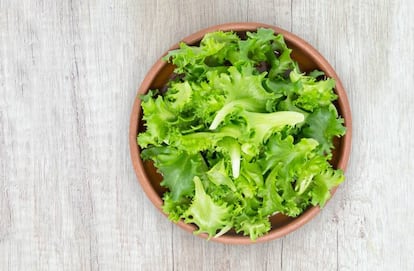Why a post-vacation diet is a bad idea
It’s no good measuring our health in kilos; it’s what we eat and do that matters

Just when you thought the summer was never going to end, here we are in September. It’s been five minutes since you sat down in front of your computer, but it feels as though five months have passed since you enjoyed the sea breeze and a lazy afternoon, stretched out on a towel. It was probably the day before yesterday, but the emotional distance between that life and our return to reality makes Ulysses’ Odyssey seem like a day outing.
The rude awakening is normal; every year, it’s the same and in a few hours, or a few days, you will have got back in the groove. But right now, everything feels wrong. Every email waiting for an answer seems like an unsurmountable challenge and, to top it off, your self-destructive instincts had you climbing onto the scales this morning to confirm a lingering suspicion. Yep – the numbers staring back at you are somewhat different from what they were a month ago. Your pedantic, unbearable and obtuse work colleague has already seized the opportunity to remark sarcastically on how good you’ve been to yourself, at which point, I would just like to offer up some unsolicited advice: stop commenting on other people’s bodies, even if you think you’re being complimentary – if someone has lost weight, for example, we don’t actually know why.
In short: as you get your nose back to the grindstone, you are especially vulnerable, which turns you into a target to be bombarded with a barrage of messages about diets, miracle products and a sculpted body that can be yours in a week. The rational part of you knows that losing five kilos in record time is baloney. You are well aware that miracles don’t exist. But you’re eager to feel better about yourself, and who’s to say that this particular diet won’t be different?
Our weight distracts us from what is important
We depart from the popular misconception that conditions everything that follows: weight is the axis around which our health and body-image-satisfaction revolve. This approach is problematic in several respects, according to Weight Science: Evaluating the Evidence for a Paradigm Shift. Weight alone gives us scant information about our body composition; weight loss is not necessarily related to better health; focusing on weight leads to the stigmatization of people who fall outside the ideal, and concern with weight drives eating disorders, all of which should be enough to take the kilos out of the good-health equation.
The practical, patient-centered European guidelines for the treatment of obesity in adults in primary care indicate that when dealing with a patient with obesity “the goal should be to focus on lifestyle changes, body composition and waist reduction, rather than weight loss per se.” In other words, making healthy long-term changes to your life will have a positive impact, regardless of whether or not they are associated with weight loss.
“Dieting” is the wrong way to lose weight
To clarify, dieting does not work if what you want is to shed kilos and maintain your new weight. Diets can help you to get into that outfit for an imminent wedding, but you are likely to regain what you lost, plus several kilos to boot while doing little to improve your general health and body composition. I understand that it is tempting to look for a short-term solution; of course, the problem is urgent and there’s nothing as tempting as a quick fix.

To begin with, let’s turn the very concept we have of dieting on its head, that idea of following an eating plan that involves changes for a limited time. Because what happens when the diet comes to an end? The British Medical Journal published a systematic review of studies on 14 popular diets in 2020, classifying them into low-carbohydrate, low-fat and moderate macronutrient diets and comparing their effectiveness at six and 12 months. All of the diets produced some weight loss at six months, but this was reduced at 12 months. The authors conclude that the impact between the different diets is marginal, so each person should choose the diet that is easiest to follow. More importantly, they indicate that a longer adherence to the diet – which is easier if it’s easy to follow – would probably have led to more weight loss and a more positive cardiovascular risk impact.
It’s okay to get angry
We all know that the stated intention: “I’m starting my diet on Monday” is not going to end well. So, now I’m going to lay out definitive arguments that will shatter your notion of diets, miracle products and the gurus who promote them for good. I am going to appeal to your rage and play on the fact that being furious can be very motivating. In fact, we don’t value it enough as an engine of personal change. So, here it is: what happens when you go on a diet is that they are getting rich at your expense.
Somewhere out there, there’s a man smoking a cigar on a yacht and tossing lobsters to his inferiors –call them employees or slaves, if you will – watching his bottom line grow in line with your frustration. According to Grand View Research, the weight loss market accounted for more than $132 billion in 2021 and is projected to continue to grow an estimated 10% annually until 2030. Of the different categories measured – fitness equipment, surgical equipment, services and diets – most of the market’s profits come from diets in the shape of weight loss foods, beverages and supplements.
The market for these products is growing, as we ourselves grow increasingly overweight and obese. Not only do the products not work, but that’s actually the point: money is being made from the fact they don’t. By the way, that cigar-puffing gentleman has undoubtedly got a few shares spread across the media that has helped to created and perpetuate the stereotypical ideal body type. Masterstroke.
You waste your time in a fruitless effort: you, who have little enough time in the day as it is, who are permanently exhausted, who juggle the mental burden of work and family, are now also taking care to count calories and calculate carbohydrates or whatever your new diet demands of you. In the apparent “best case scenario,” you can lose the kilos you want, keep them off for a while and then put them back on; something that, according to Juan Revenga’s The Diet is not the Answer, happens in most cases.
From bad to worse
You might also gain more weight than you lost and get into a dynamic of chasing one diet with another. What follows is a vicious cycle of dieting-deprivation-eating to feel better; disappointment and guilt for having eaten; then back to the diet again. Your ambitions are bound to be thwarted if the diet demands a lot of extra effort, meaning you have to make separate meals or stop doing things you enjoy like eating with your family: if it makes your life difficult, it’s not a good diet.
Then there is the belief that if you lose weight, it’s because you have willpower and merit and, conversely, if you don’t, it’s because you haven’t tried hard enough. You have to try harder. But enough is enough. The stigma around weight is largely due to the fact that we attribute responsibility to the individual and that’s a major misnomer.

We do not all start with the same biological make-up, nor do we have the same social or economic circumstances; we haven’t grown up in the same environment, nor do we have the same access to healthy foods, nor, of course, do we have similar psychological conditioning factors (yes, all this affects our weight as you can see in the Obesity System Map developed by the British government).
You have already managed to resist the bombardment of “if you want to, you can.” Now, you just have to apply that same message to resisting the diet mongers. Not dieting is a form of revolution: today the only thing you have to worry about is getting through your first day back at work. Forget about the scales and dismiss that voice in your head determined to make you feel bad. Cut yourself some slack.
If in a few days, when you feel like grabbing your bag and walking out of the office for good, you still have the idea you need to be in better physical and mental shape, that’s the time to take a realistic look at what you can improve in your diet and which lifestyle habits to switch or ditch.
Tu suscripción se está usando en otro dispositivo
¿Quieres añadir otro usuario a tu suscripción?
Si continúas leyendo en este dispositivo, no se podrá leer en el otro.
FlechaTu suscripción se está usando en otro dispositivo y solo puedes acceder a EL PAÍS desde un dispositivo a la vez.
Si quieres compartir tu cuenta, cambia tu suscripción a la modalidad Premium, así podrás añadir otro usuario. Cada uno accederá con su propia cuenta de email, lo que os permitirá personalizar vuestra experiencia en EL PAÍS.
¿Tienes una suscripción de empresa? Accede aquí para contratar más cuentas.
En el caso de no saber quién está usando tu cuenta, te recomendamos cambiar tu contraseña aquí.
Si decides continuar compartiendo tu cuenta, este mensaje se mostrará en tu dispositivo y en el de la otra persona que está usando tu cuenta de forma indefinida, afectando a tu experiencia de lectura. Puedes consultar aquí los términos y condiciones de la suscripción digital.









































